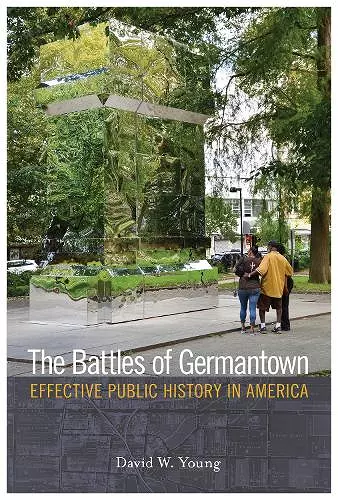The Battles of Germantown
Effective Public History in America
Format:Hardback
Publisher:Temple University Press,U.S.
Published:13th Sep '19
Currently unavailable, and unfortunately no date known when it will be back
This hardback is available in another edition too:
- Paperback£23.99(9781439915554)

2020 Philip S. Klein Book Prize Winner, Pennsylvania Historical Association
Known as America’s most historic neighborhood, the Germantown section of Philadelphia (established in 1683) has distinguished itself by using public history initiatives to forge community. Progressive programs about ethnic history, postwar urban planning, and civil rights have helped make historic preservation and public history meaningful. The Battles of Germantown considers what these efforts can tell us about public history’s practice and purpose in the United States.
Author David Young, a neighborhood resident who worked at Germantown historic sites for decades, uses his practitioner’s perspective to give examples of what he calls “effective public history.” The Battles of Germantown shows how the region celebrated “Negro Achievement Week” in 1928 and, for example, how social history research proved that the neighborhood’s Johnson House was a station on the Underground Railroad. These encounters have useful implications for addressing questions of race, history, and memory, as well as issues of urban planning and economic revitalization.
Germantown’s historic sites use public history and provide leadership to motivate residents in an area challenged by job loss, population change, and institutional inertia. The Battles of Germantown illustrates how understanding and engaging with the past can benefit communities today.
“(A) detailed and powerful new book.... Young is eager for public history to move beyond what he calls 'building-ism,' the disproportionate focus on the architectural features of historic places, and to focus instead on 'beingness,' a fuller appreciation for the communities and social engagement processes that make and remake history on a daily basis.... But 'effective public history' is fundamentally about people and their communities. How the history of a place is made, interpreted, and preserved or discarded depends on who occupies that place and whose voices get heard. As such, this book... (should) be of great interest to social scientists, urban planners, and activists interested in how urban communities develop, change, and record their memories..”—Journal of Urban Affairs
"Germantown has played an important role in Philadelphia history. But for many years it was best known as the site of a Revolutionary War battle in which George Washington’s army lost. As David W. Young shows in this book about the politics of public memory, reenactments of the 1777 Battle of Germantown, first conducted in 1877, obscured more than they revealed about the history of this neighborhood. Only after public historians reimagined their interpretations of it could Germantown’s rich and complex history attract widespread community interest and engagement.... Young’s message is personal and political as well as analytical."—Journal of American History
"The power of this book comes from the author using that local history to highlight issues of class, race, and gender that have universal applicability to public history as practiced at the community level. Young’s work is a masterful combination of current scholarship and his lived experience.... This book should be read by everyone interested in public history, and it is a response to the common complaint that often links declines in historic site visits and historical society membership with the claim that people just are not interested in history anymore." —American Historical Review
"These books question how memory, patriotic nationalism, descendent privilege, and urban development have combined to manipulate the presentation of history to the public.... [Young's] book address[es] how preservationists tied their work to the economic revitalization of their communities.... His memoir argues that Germantown turned a crucial corner when it deemed community engagement itself profitable, a recipe for relevancy and resiliency." —Journal of Urban History
ISBN: 9781439915547
Dimensions: 229mm x 152mm x 28mm
Weight: unknown
286 pages